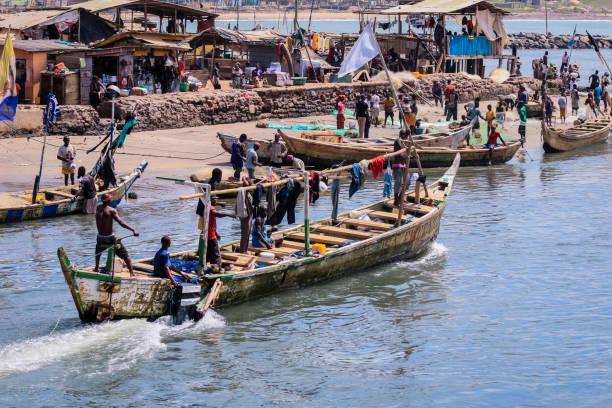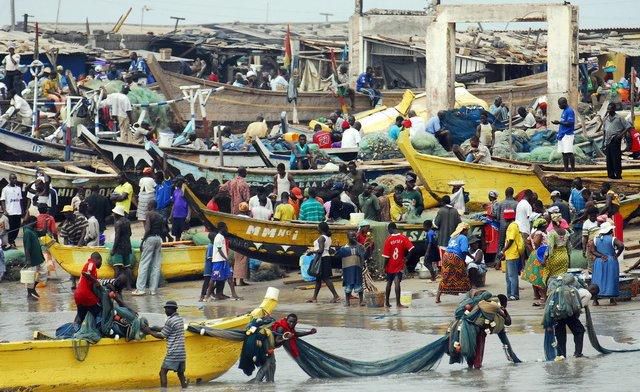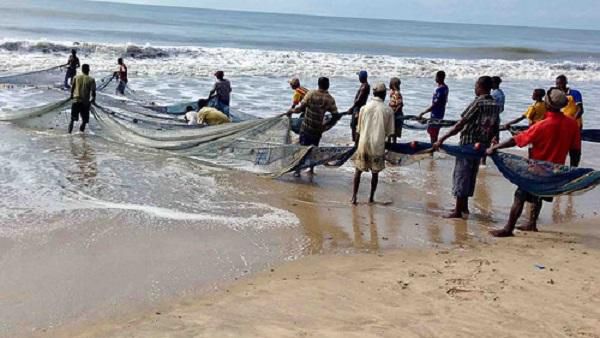Navigating troubled waters: Challenges facing Ghana's fishing industry
)
Here, we delve into the multifaceted challenges confronting Ghana's fishing industry and explore potential pathways towards a more prosperous and resilient future.
1. Overfishing Threatens Sustainability
Overfishing, driven by increasing demand and unsustainable fishing practices, has placed immense pressure on Ghana's fish stocks. As fish populations dwindle, the livelihoods of coastal communities reliant on fishing are under threat. Without concerted efforts to regulate fishing activities and promote sustainable practices, the long-term viability of Ghana's fisheries hangs in the balance.
2. Illegal Fishing Casts a Shadow
The specter of illegal, unreported, and unregulated (IUU) fishing looms large over Ghana's waters. Unauthorized fishing by foreign vessels and unregulated artisanal fishing operations undermine efforts to manage fisheries sustainably. IUU fishing not only depletes fish stocks but also deprives legitimate fishers of their livelihoods, exacerbating the challenges facing the industry.

3. Regulation and Enforcement Gaps
Weak regulation and enforcement mechanisms have exacerbated the challenges facing Ghana's fishing industry. Inadequate monitoring, control, and surveillance allow illegal fishing activities to persist unchecked. Strengthening regulatory frameworks and enhancing enforcement capabilities are imperative to curbing unsustainable practices and safeguarding the future of Ghana's fisheries.
4. Climate Change Adds Complexity
The impacts of climate change, from rising sea temperatures to changing weather patterns, pose additional challenges to Ghana's fishing industry. These environmental changes affect fish habitats and migration patterns, further straining already vulnerable fish stocks. Adaptation strategies that bolster the resilience of coastal communities and fisheries ecosystems are essential in the face of climate-related challenges.

5. Infrastructure Decline Hampers Progress
The decline in fish processing infrastructure, including cold storage facilities and processing plants, limits the value addition and export potential of Ghana's fishery products. Inadequate infrastructure hampers efforts to meet international quality standards and access lucrative export markets, stifling the industry's growth and economic contribution.
6. Access to Finance and Technology Lags
Limited access to finance and technology impedes the modernization and efficiency of Ghana's fishing sector. Small-scale fishers often lack access to credit, investment capital, and modern fishing gear, constraining their productivity and competitiveness. Addressing these barriers is crucial to unlocking the industry's full potential and fostering sustainable growth.

7. Conflicts Over Resources
Conflicts over access to fishing grounds and resource rights exacerbate tensions within Ghana's fishing industry. Competition between artisanal fishers, industrial trawlers, and other stakeholders underscores the need for inclusive governance processes and effective fisheries management strategies. Resolving these conflicts and promoting equitable resource allocation are essential steps towards a more harmonious and sustainable industry.
8. Impacts on Livelihoods and Food Security
The challenges facing Ghana's fishing industry have profound implications for the livelihoods and food security of millions of people. Declining fish stocks and reduced catch levels threaten the economic opportunities and nutritional intake of fishing communities, exacerbating poverty and food insecurity along the coast. Addressing these challenges is not only a matter of economic importance but also a moral imperative to safeguard the well-being of vulnerable populations.
Addressing the multifaceted challenges outlined above requires a comprehensive and collaborative approach, involving government agencies, civil society organizations, fishing communities, and international partners.
)
)
)
)
)
)
)
)
)
)
)
)
)
)
)
)